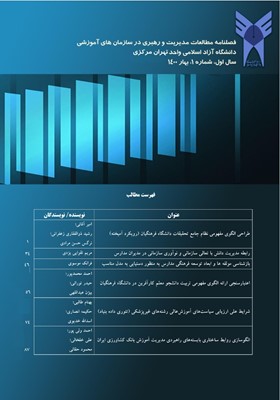شرایط علی ارزیابی سیاستهای آموزشعالی رشتههای غیرپزشکی (تئوری داده بنیاد)
محورهای موضوعی : مدیریت آموزشی
بهنام طالبی
1
*
,
حکیمه انصاری
2
,
اسدالله خدیوی
3
![]()
1 - هیئت علمی گروه علوم تربیتی، دانشگاه آزاد اسلامی، واحد تبریز، تبریز، ایران
2 - دانشجوی دکتری مدیریت آموزشی، دانشگاه آزاد اسلامی، واحد تبریز، تبریز، ایران.
3 - رئیس دانشگاه فرهنگیان تبریز، ایران
کلید واژه: ارزیابی, سیاست, شرایط علّی, آموزش غیرپزشکی,
چکیده مقاله :
این پژوهش با هدف بررسی شرایط علّی ارزیابی سیاستهای آموزشعالی رشته های غیرپزشکی انجام پذیرفت. روش تحقیق پژوهش بصورت کیفی(تئوری داده بنیاد)- کمّی(پیمایشی) میباشد. تعداد 17 نفر از خبرگان شامل نماینده مجلس، مدیران و اساتید دانشگاهی جهت مصاحبه حضوری با روش غیرتصادفی هدفمند انتخاب شدند. پرسشنامهها از روی مصاحبه های کدگذاری و تایید شده، با روش سه سو سازی طراحی شد. در بخش کمّی از بین اساتید و مدیران آموزشی رشته های غیر پزشکی استان آذربایجان شرقی، تعداد 200 نفر بر اساس استاندارد تعیین حجم نمونه در تحلیلعاملی (رعایت حداقل 200 نمونه) انتخاب شد. به منظور تحلیل داده های بدست آمده از مصاحبه ها، فرایند سه مرحله ای کد گذاری باز، محوری و انتخابی استفاده شده است. ابعاد و مولفه ها تعیین شد و مدل مورد بررسی قرار گرفت. جهت توصیف داده ها از نرم افزارهای آماریspss و Lisrel استفاده شد. نتایج تحلیلعاملی تاییدی مرتبه اول و دوم نشان داد شرایط علّی ارزیابی سیاستهای آموزشعالی رشته های غیر پزشکی شامل نیاز کشور به نیروی آموزش دیده، نبود برنامه ریزی آموزشی قوی، نبود آموزشهای مهارتی در سطح آموزشعالی، نیاز به هماهنگی سیاستهای آموزشعالی با بازارکار می باشد. نتیجه نهایی اینکه شرایط علّی ارزیابی سیاستهای آموزشعالی رشته های غیرپزشکی نیازمند سیاستگذاری ها و برنامهریزیهای دقیق در حوزه مهارتی و تطابق با بازارکار منطقهای می باشد.
The aim of this study was to investigate the causal conditions for evaluating higher education policies in non-medical disciplines. The research method is qualitative research (data foundation theory) - quantitative (survey). A total of 17 experts, including members of parliament, administrators and university professors, were selected for face-to-face interviews using a non-random, purposeful method. Questionnaires were designed from coded and validated interviews using triangulation. In the quantitative section, among the professors and educational directors of non-medical disciplines of East Azerbaijan province, 200 people were selected based on the standard of determining the sample size in factor analysis (observing at least 200 samples). In order to analyze the data obtained from the interviews, a three-step process of open, centralized and selective coding was used. Dimensions and components were determined and the model was examined. SPSS and Lisrel statistical software were used to describe the data. The results of the first and second confirmation factor analysis showed that the causal conditions for evaluating higher education policies in non-medical fields include the country's need for trained personnel, lack of strong educational planning, lack of skills training at the higher education level, and the need to coordinate higher education policies with the labor market. The final result is that the causal conditions for evaluating higher education policies in non-medical disciplines require precise policy-making and planning in the field of proficiency and Adaptation to the regional labor market.
_||_

